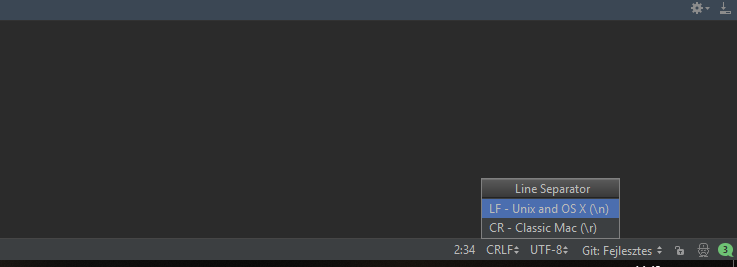env: pythonr: нет такого файла или каталога
5 ответов
скрипт содержит символы CR. Оболочка интерпретирует эти символы CR как аргументы.
решение: удалите символы CR из сценария, используя следующий сценарий.
with open('beak', 'rb+') as f:
content = f.read()
f.seek(0)
f.write(content.replace(b'\r', b''))
f.truncate()
откройте файл в vim или vi и выполните следующую команду:
:set ff=unix
сохранить и выйти:
:wq
готово!
объяснение
ff расшифровывается как формат и может принимать значения unix (\n),dos (\r\n) и mac (\r) (предназначен только для использования на маках pre-intel, на современных маках use unix)..
Читать подробнее о ff команда:
:help ff
:wq расшифровывается как Wобряд и Quit, более быстрый эквивалент Shift+zz (т. е. удерживая Shift нажмите клавишу z в два раза).
обе команды должны использоваться в командный режим.
загрузка нескольких файлов
нет необходимости фактически открывать файл в vim. Изменение можно сделать непосредственно из командной строки:
vi +':wq ++ff=unix' file_with_dos_linebreaks.py
для обработки нескольких *.py файлы:
for file in *.py ; do
vi +':w ++ff=unix' +':q' ${file}
done
ответ falsetru полностью решил мою проблему. Я написал небольшой помощник, который позволяет мне нормализовать окончания строк нескольких файлов. Поскольку я не очень знаком с вещами line-endings на нескольких платформах и т. д. терминология, используемая в программе, может быть не на 100% правильной.
#!/usr/bin/env python
# Copyright (c) 2013 Niklas Rosenstein
#
# Permission is hereby granted, free of charge, to any person obtaining a copy
# of this software and associated documentation files (the "Software"), to deal
# in the Software without restriction, including without limitation the rights
# to use, copy, modify, merge, publish, distribute, sublicense, and/or sell
# copies of the Software, and to permit persons to whom the Software is
# furnished to do so, subject to the following conditions:
#
# The above copyright notice and this permission notice shall be included in
# all copies or substantial portions of the Software.
#
# THE SOFTWARE IS PROVIDED "AS IS", WITHOUT WARRANTY OF ANY KIND, EXPRESS OR
# IMPLIED, INCLUDING BUT NOT LIMITED TO THE WARRANTIES OF MERCHANTABILITY,
# FITNESS FOR A PARTICULAR PURPOSE AND NONINFRINGEMENT. IN NO EVENT SHALL THE
# AUTHORS OR COPYRIGHT HOLDERS BE LIABLE FOR ANY CLAIM, DAMAGES OR OTHER
# LIABILITY, WHETHER IN AN ACTION OF CONTRACT, TORT OR OTHERWISE, ARISING FROM,
# OUT OF OR IN CONNECTION WITH THE SOFTWARE OR THE USE OR OTHER DEALINGS IN
# THE SOFTWARE.
import os
import sys
import glob
import argparse
def process_file(name, lend):
with open(name, 'rb') as fl:
data = fl.read()
data = data.replace('\r\n', '\n').replace('\r', '\n')
data = data.replace('\n', lend)
with open(name, 'wb') as fl:
fl.write(data)
def main():
parser = argparse.ArgumentParser(description='Convert line-endings of one '
'or more files.')
parser.add_argument('-r', '--recursive', action='store_true',
help='Process all files in a given directory recursively.')
parser.add_argument('-d', '--dest', default='unix',
choices=('unix', 'windows'), help='The destination line-ending '
'type. Default is unix.')
parser.add_argument('-e', '--is-expr', action='store_true',
help='Arguments passed for the FILE parameter are treated as '
'glob expressions.')
parser.add_argument('-x', '--dont-issue', help='Do not issue missing files.',
action='store_true')
parser.add_argument('files', metavar='FILE', nargs='*',
help='The files or directories to process.')
args = parser.parse_args()
# Determine the new line-ending.
if args.dest == 'unix':
lend = '\n'
else:
lend = '\r\n'
# Process the files/direcories.
if not args.is_expr:
for name in args.files:
if os.path.isfile(name):
process_file(name, lend)
elif os.path.isdir(name) and args.recursive:
for dirpath, dirnames, files in os.walk(name):
for fn in files:
fn = os.path.join(dirpath, fn)
process_file(fn, fn)
elif not args.dont_issue:
parser.error("File '%s' does not exist." % name)
else:
if not args.recursive:
for name in args.files:
for fn in glob.iglob(name):
process_file(fn, lend)
else:
for name in args.files:
for dirpath, dirnames, files in os.walk('.'):
for fn in glob.iglob(os.path.join(dirpath, name)):
process_file(fn, lend)
if __name__ == "__main__":
main()

